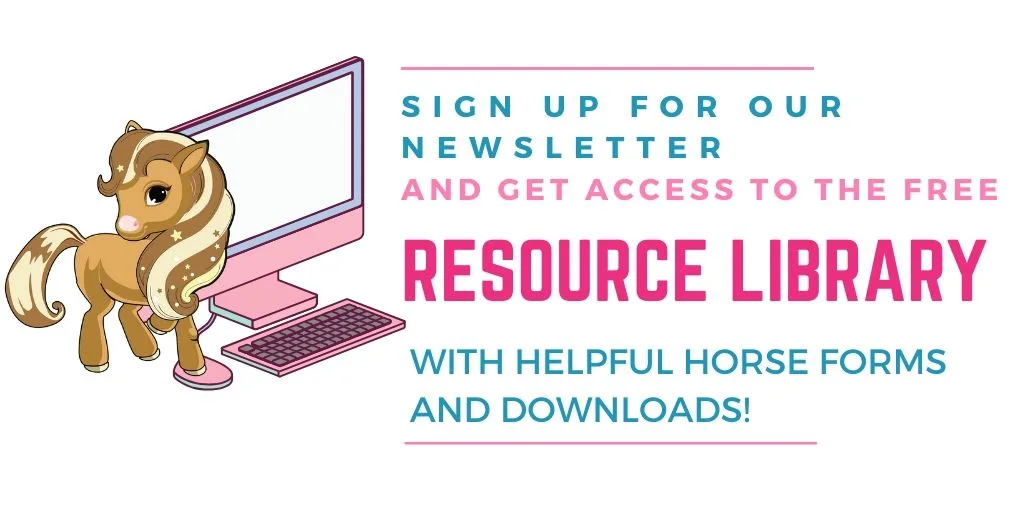So many of the best foods are potatoes: French fries, chips, tater tots, latkes, gnocchi, home fries, mashed potatoes… The list is virtually endless. And, especially when it comes to things like fries and chips, potatoes make for a quite easy and handy snacking food. Potato chips may be something you take on the trail, but should they be something you share with your pony, as you would apple slices or baby carrots? Can horses eat potatoes.
Can horses eat potatoes? Horses should not eat potatoes, especially not raw ones. Potatoes are a member of the nightshade family, making them inherently quite toxic to equines.
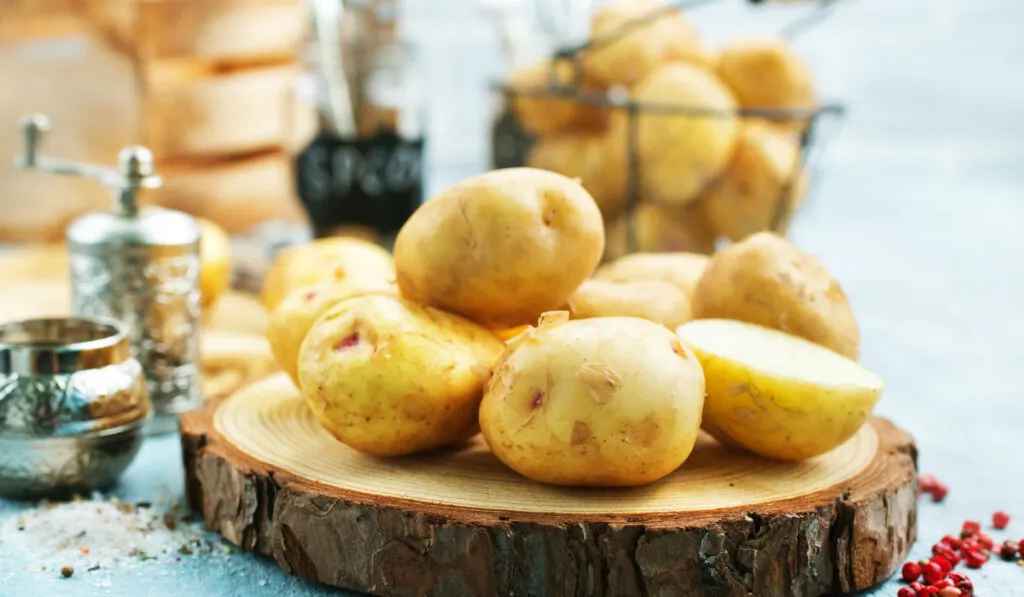
Luckily, potatoes and other nightshade plants tend to be inherently off putting to horses, but potatoes can still find their way into snacks, treats, etc. and in some delicious forms (ahem, fries) that a horse may eat unknowingly.
Some horses may be unaffected by potatoes, but that’s not really a risk worth taking. There is a significant more danger in feeding horses raw potatoes than cooked one but, the bottom line? Just say no to feeding horses potatoes.
Table of Contents
Potato Poisoning
That’s right – potatoes are considered so bad for horses, they actually have a unique type of poisoning associated with them (source). And, while a small bite or two of a potato likely will do no harm, a decent amount will probably cause some distress.
The main reason potatoes are potentially so harmful is that they, much like tomatoes, eggplant and peppers, come from the nightshade family, a.k.a. one of the most toxic types of wild plants (for livestock, horses and cattle) native to the United States.
While some horses may graze on potatoes without suffering ill effects, other horses often experience substantial gastrointestinal distress, which, in equines, can quickly become more complicated.
Because of this high risk, it is best to assume potatoes are going to make your horse sick, rather than run the risk of them experiencing poisoning symptoms.
When it comes to potato poisoning, it is of course quantity that matters. A horse who has only had a few bites most likely will be fine, but the severity of symptoms increases with the amount of potato eaten.
Higher amounts ingested can cause horses to experience upset stomachs, cramping, shortness of breath, colic, excessive thirst,etc. It is rare, but extreme cases can even lead to death or long-term chronic conditions such as inflammatory bowel disease.
Most members of the nightshade family, though, are flavors that horses tend to not enjoy. They may take a quick nibble or sample, but often will not enjoy it and so will move on to other foods.
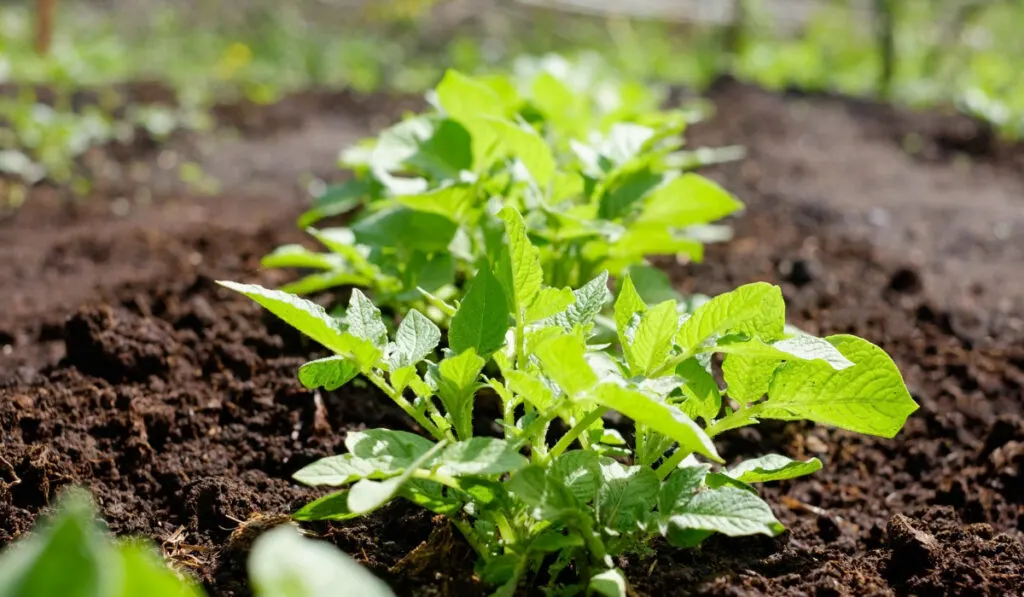
Symptoms of Potato Poisoning in Horses
However, if horses do ingest potatoes – or the potato plant – there are certain symptoms that may present for poisoning, depending on the amount ingested:
- Cramping
- Excessive drooling
- Excessive thirst
- Abdominal swelling
- Diarrhea
- Colic
If the potato poisoning is more intense, you may notice:
- Respiratory distress
- Confusion
- Loss of appetite
Poisonous Potato Parts
While all parts of the potato may be harmful, it is especially the potato plant that presents the most danger. That being said, though, the actual potato itself should still be avoided.
Aside from just health dangers, potatoes are very starchy. And horses have naturally finicky inner workings, meaning this introduction of a lot of starch can upset their stomachs by sheer novelty and density alone. Plus, horses are not evolved to break down quantities of carbohydrates, and so potatoes can lead to an overweight horse.
Lastly, horses lack the ability to vomit (read my article about that). This means that if the potato causes an upset stomach or an irritation, your horse can’t expel it from its body.
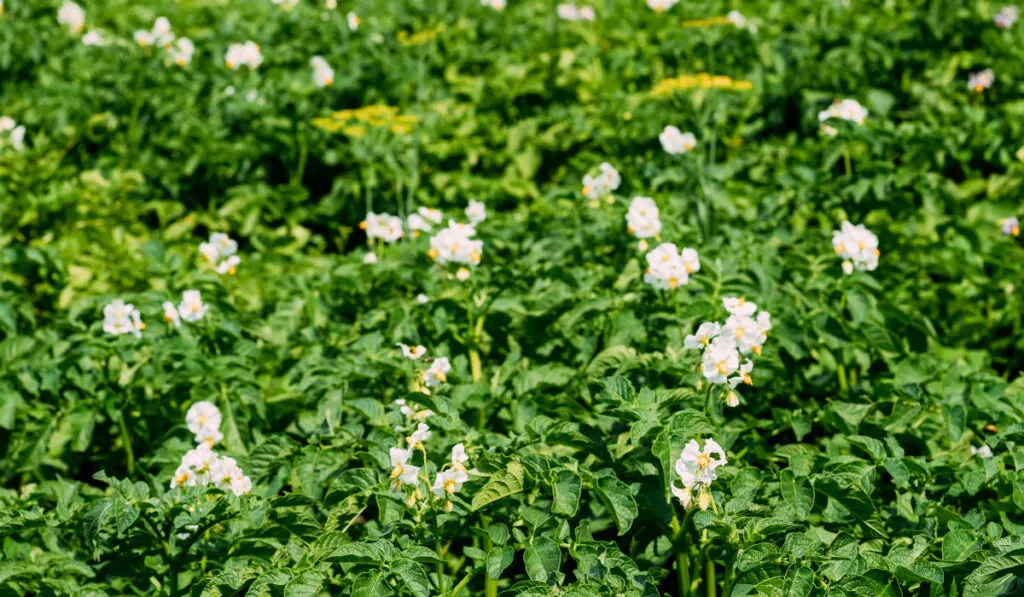
What to Do If Your Horse Eats Potatoes
To start, it is good to remember that horses are much larger and hardier than people, so just a few bites of potato or potato plant really won’t hurt them – it takes a larger quantity.
So, before you panic, the first step should be to assess just how much they have eaten. A few tots or chips and they should be fine, save for possible mild indigestion or other small digestive issues.
However, if your horse has eaten a greater quantity of potatoes and they are showing outward signs of drooling, an upset stomach, excessive thirst, etc., you should contact your vet.
Here, timing is crucial, as the faster a vet can diagnose the poisoning and administer treatment (usually with doses of neostigmine and activated charcoal), the more likely it is the poisoning will not be able to do lasting damage.
Raw Potatoes
Avoid, avoid, avoid. As we learn from several sources, including the FDA Poisonous Plant Database, potatoes in their raw form carry potential danger in the form of solanine.
This is a substance that is found in many plants and vegetables (trace amounts that are still safe for human consumption in tomatoes, which makes sense since they are also members of that pesky nightshade family).
Solanine from potatoes, though, is only harmless and has no effect on humans when potatoes are cooked, as that process breaks it down. Left alone, this substance is quite poisonous.
There is also quite a lot of solanine found in raw potatoes, making them unsafe to feed to your horse. Though most of the solanine concentration is found in the green parts and all the leaves, there can still be traces found in the parts that we eat in varying quantities, and that is why it is unwise to risk feeding raw potatoes to your horse.
Potato Skin
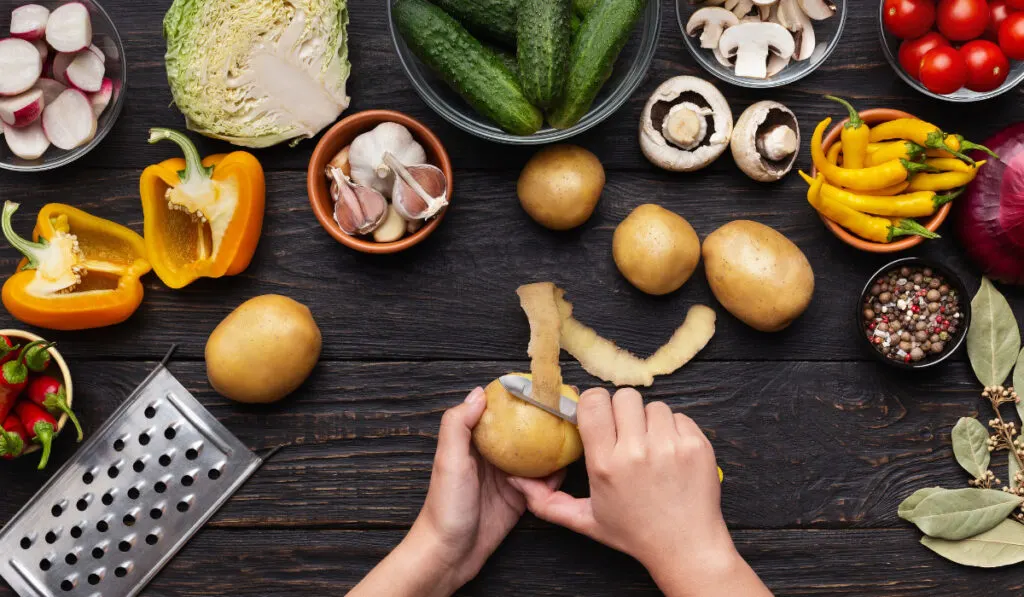
Feeding potato skins to horses is a BIG no. Though it may seem harmless (or even efficient in terms of waste reduction), you should never allow your horse to eat potato skins.
Even more so than the potato flesh itself, the peels present an even greater concentration of toxic solanine. In fact, according to a paper by Marita Cantwell at U.C. Davis, solanine concentration is 3 – 10 times greater in potato peels than potato flesh (source).
Since solanine needs to be cooked to be broken down, and potato skins rarely are, they are a big concern.
Solanine is especially prevalent in the green areas on a potato, where it is freshest. Noticing all those green areas on potatoes can be hard, which adds another level of danger. Keep in mind that solanine can still be present in younger potatoes and their skin even when no green is showing.
And, as mentioned earlier in regards to the flesh of a potato, a horse’s inability to vomit becomes an issue again. The starchiness of potatoes is still found in the peels, and that can make them potentially swell up in the horse’s throat – a potential choking hazard.
Cooked Potato
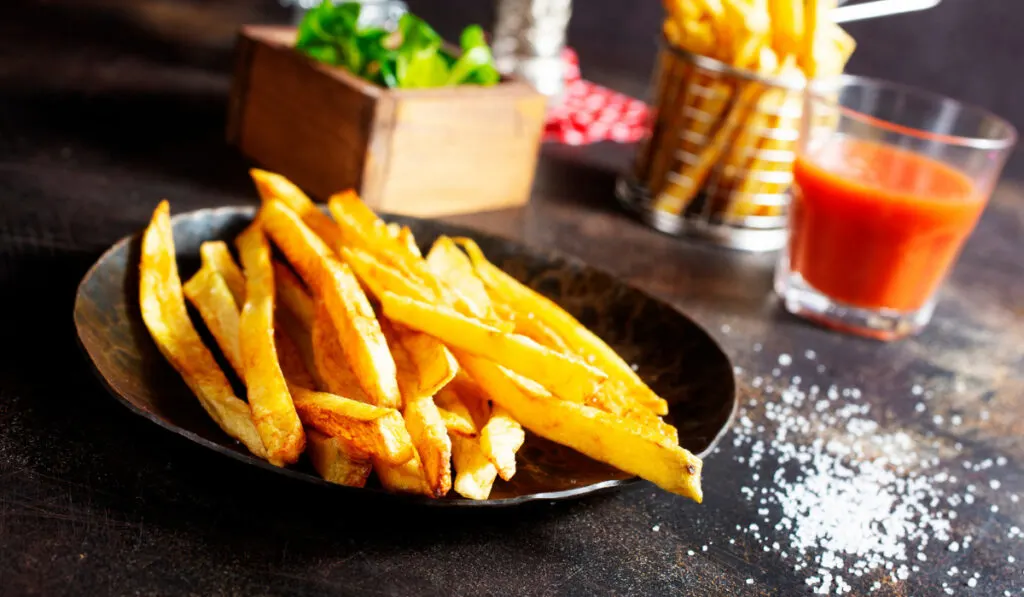
If solanine is such a concern in raw potatoes and potato plants, and if it is broken down and potatoes made safe for humans by cooking, can you feed cooked potatoes to your horse? While, yes, the toxins will have been most likely cooked out, there is still the chance traces remain.
Also, when it comes to commercially made and processed potato snacks, such as chips or tots, they are full of chemicals and sodium that will only disrupt your horse’s digestive system.
If you must feed your horse potatoes or potato-based treas, you must, must, only use cooked potatoes. Heat is the only way to ensure solanine is not present.
While, theoretically, cooked potatoes are most likely not toxic, there is always a risk. Additionally, potatoes – even cooked ones – still can present a choking hazard or an unhealthy addition of starch, meaning upset stomachs and possible unhealthy weight gain.
At the end of the day, raw potatoes and potato skins should be 100% avoided and, instead of cooked potatoes, it is best to stick to apples, carrots or other safe treats.
Source:
- https://www.cfsanappsexternal.fda.gov/scripts/plantox/detail.cfm?id=19484

